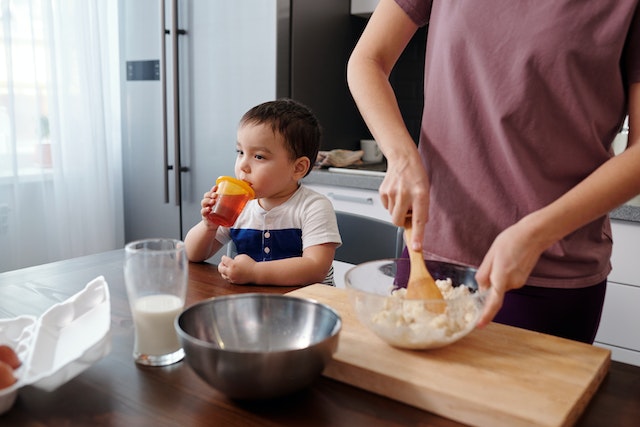
When there is no cure for food allergy, it is important to know the symptoms of food allergy.
That way, you can tell your child to avoid the food, or take an antihistamine before eating it.
It is also important for children with food allergy to have access to treatment for their symptoms.
This is especially important for children who are at risk of developing anaphylaxis, which can happen quickly.
Why is Allergy Awareness is Important?
The most important thing that parents can do to protect their child from food allergies is to be aware of the potential allergens in their child’s environment.
Parents should know what foods their child is allergic to.
When parents are aware of their child’s allergies, they can take precautions and create a more safe environment for them.
If a child has a peanut allergy, for example, then the parents should never have peanuts in their house or keep peanuts around the house at all.
The more parents are aware of food allergies, the better prepared they can be to protect their child from developing an allergy to something that could lead to anaphylactic shock.
How to Raise Children with Food Allergy
With allergies, parents are on the front line. This list offers practical information, insight, and guidance to help you raise your child with food allergies safely and effectively.
Here are some tips for you to help your child with food allergies thrive:
1. Take an active role in your child’s care
It’s critical that you be part of the team of professionals who care for your child with food allergies.
Be knowledgeable about the medicines, tests, and procedures used to monitor and manage your child’s condition.
Allergenic food reactions may occur at any age, so you must learn about how to manage your child‘s reactions in case of an emergency.
You should also be prepared to handle medical emergencies and know what to do if your child has a serious allergic reaction.

Photo by Jep Gambardella on Pexels.
2. Have all the information about your child’s diet
Keep him safe from accidental or intentional exposure to food allergens.
Tree nuts are among the most common food allergens and include almonds, pecans, walnuts, and pistachios.
Allergies to peanuts are rare, but occur. For example, a child who had severe peanut allergy during infancy can have a milder form of the allergy in adolescence.
Allergies to fish or shellfish are also relatively uncommon but can occur.
3. Do not leave your child alone while eating
Young children don‘t usually check food labels, and it is easy for them to eat something that they shouldn‘t accidentally.
If they have allergy or sensitivity issues, they may accidentally eat something that they shouldn‘t, which can lead to life-threatening issues.
It is best to avoid foods with a specific allergen or sensitivities if your child has allergies.
If you do have to leave them alone while eating, make sure you only have safe foods available for them.
If you’re unsure of the safety of any food, it’s always best to avoid it and avoid having it in the house.
4. Ask your doctor what other steps you should take
When a parent is educated about his or her child‘s specific situation, it’s easy to understand when extra precautions may be necessary.
Severe food allergy or serious medical condition may make it necessary to be very careful about food allergies, or what can be safely consumed.
If you are concerned about your child‘s health or safety, or you‘re unsure of how to proceed, talk with your doctor.
5. Avoid cross-contamination
Besides eating in a separate area, you should also avoid cross-contamination between the food you are preparing and the foods that your child is allergic to.
For example, if you’re cooking fish, don’t touch the fish or put it near your child’s food or on his plate until he’s done eating.
It may seem like extra work, but it’s important to keep your child safe from an accidental reaction.
Food preparation in a separate area also allows you to cook safely with the different ingredients you are using.
6. Ask your child’s doctor if you can carry epinephrine with you when you eat out
Epinephrine is an emergency medication used to treat severe allergic reactions.
Ask your child’s doctor about the benefits and risks of carrying epinephrine with you when you eat out.
It may be a good idea to keep this in mind when making dinner plans. Unsafe food allergic reactions can happen quickly, so being prepared can help prevent an allergic reaction.

Photo by Jep Gambardella on Pexels.
7. Consider dietary supplements
When food allergies are severe, parents may consider dietary supplements such as nutraceuticals and amino acids.
A wide range of supplements are available to support the immune system.
For example, amino acids, glutamine and L-glutamine, can help to maintain the integrity of the gut barrier and reduce inflammation.
Additional nutritional support includes vitamin C and antioxidants such as selenium and vitamin E, which help to neutralize free radicals that may trigger food allergies.
In addition, essential fatty acids (omega-3s) such as flaxseed oil, fish oil and cod liver oil can improve allergy symptoms.
8. Discuss possible blood testing
If your child’s food allergy is severe, he may be eligible for blood testing.
This type of testing may help to determine if there is a possible food allergen that can trigger an allergic reaction.
People with food allergies are often tested for many different foods at the same time.
The doctor or nurse will check to see if the blood test reaction is positive.
Awareness About Food Allergies
Although anaphylaxis is a severe reaction, there are ways for parents to prevent a severe allergic reaction from occurring in their child with food allergies.
Many children outgrow food allergies, but some children may not eat some foods safely.
That way, it is very important for parents of children with food allergies to follow all instructions given by a doctor or registered dietitian regarding their child’s diet.
Our blog, Mature Parent, will help you stay informed about food allergies and will provide you with tips on how to raise children with food allergies safely.
Check out our blog for more tips now!



